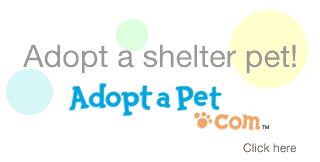Here's a great story that I thought I would pass on...hope you find it inspiring! –Kim
Saved By Grace
 Knock on Grace Acosta's door at her home in Miami, and you are likely to get a friendly greeting from a medley of canines. Five pooches are rescue mixes, one is a Rottweiler rescue, and six are Rottweilers from her own breeding.
Knock on Grace Acosta's door at her home in Miami, and you are likely to get a friendly greeting from a medley of canines. Five pooches are rescue mixes, one is a Rottweiler rescue, and six are Rottweilers from her own breeding.
Nearly every dog that goes into the Gulfstream Guardian Angel Rottweiler Rescue makes a stop at Grace's home. "We have very few foster homes," explains the assistant high school principal. "It hurts the rescue group because we end up paying boarding fees at a veterinary clinic."
Growing Up Rescuing Dogs
Grace's love for dogs and her desire to rescue homeless ones started early. "I've been involved in rescue since I was 3 years old," she says. "My first dog was a mix, a mutt that was roaming the streets of my neighborhood."
When she was a teenager, Grace and her family came to the United States from Cuba. She remembers telling her father she was not leaving without her three dogs. "I had rescued them from the streets," she says. "When we arrived in Miami, my dogs came with me."
Many years later, she fell in love with Rottweilers and became a breeder. In 1986, Grace joined other people who breed, show and love Rottweilers to form the Gulfstream Rottweiler Club. Since then, the club has grown to over 100 members.
Grace's love for the breed and dogs in general prompted her to start taking in Rottweilers that needed homes. As president of Gulfstream Rottweiler Club, she encouraged other members to do the same. Over time the club's rescue efforts grew until they formed a separate organization dedicated solely to Rottweiler rescue.
In 2002, Gulfstream Guardian Angel Rottweiler Rescue (GGARR) became a recognized nonprofit organization. Between July and December 2004, the group helped place more than 70 Rottweilers and Rottie mixes.
 The majority of dogs placed by GGARR are strays, and others come from the Miami-Dade County Animal Shelter. "I have a very good rapport with the Miami-Dade County Animal Services," Grace says. "When they have a Rottweiler that is going to be put down because no one is adopting the dog, they call me. If an owner calls asking for help in rehoming their dog, we offer help, too. The dog must be neutered and spayed before we place his or her picture on our Web site and on Petfinder.com. We have found homes for over 100 dogs that were owner surrendered."
The majority of dogs placed by GGARR are strays, and others come from the Miami-Dade County Animal Shelter. "I have a very good rapport with the Miami-Dade County Animal Services," Grace says. "When they have a Rottweiler that is going to be put down because no one is adopting the dog, they call me. If an owner calls asking for help in rehoming their dog, we offer help, too. The dog must be neutered and spayed before we place his or her picture on our Web site and on Petfinder.com. We have found homes for over 100 dogs that were owner surrendered."
Twenty Years & Counting
Her involvement doesn't stop there. Besides taking in virtually every dog that goes into GGARR – at least for a short period – Grace works personally behind the scenes to make sure a rescued dog has the best possible chance to be placed in a loving home. She has many stories of rescue dogs from the 20 years she has been working in Rottweiler rescue.
GGARR has two veterinary clinics that it works with extensively, both of which offer their services, including boarding, at a discount. But the costs are still high, which means that Grace may have as many as six or seven rescue dogs temporarily in her home at one time.
Grace suspects that people's biggest fear about fostering rescue dogs is that they will end up with the dog. The concern is unfounded: Every purebred Rottweiler taken in by GGARR has been placed in a permanent home.
Mixed breeds aren't as lucky though. The organization works hard to place mixed-breed dogs, although they are much more difficult to home. Many people who adopt through GGARR are familiar with the breed; they like everything about the breed, from temperament to looks, she says.
 Temporary homes for rescued dogs are one of GGARR's top needs, but as Grace says, rescue involves more than "housing" a dog. Helping transport dogs is a need that is filled by the Rottweiler Rescue Railroad, a network of volunteers from rescue organizations around the country working together to get Rottweilers to their new homes.
Temporary homes for rescued dogs are one of GGARR's top needs, but as Grace says, rescue involves more than "housing" a dog. Helping transport dogs is a need that is filled by the Rottweiler Rescue Railroad, a network of volunteers from rescue organizations around the country working together to get Rottweilers to their new homes.
In addition, transportation is needed for dogs from the shelter to a veterinary clinic or foster homes. Donations are also valuable to GGARR. In addition to money, donations of food, medicine, blankets, beds, crates, bowls and other dog supplies help keep the dogs in foster homes until permanent homes can be found.
A large number of club members volunteer their time helping to make phone calls and organize the Canine Oktoberfest and silent auction events put on by the organization each year. Most of the money raised by the rescue group is through these annual events. The Oktoberfest is held in Broward County and has been running for 11 years. The silent auction is held in conjunction with the breed club's back-to-back specialty shows in December.
If You Don't Rescue
As a breeder of Rottweilers, Grace's dogs compete in conformation and obedience, and some are therapy dogs. She also is licensed by the American Kennel Club to judge the breed. She strongly believes that all breeders should rescue and the mantra "If you don't rescue, don't breed" is on both her and the Gulfstream Rottweiler Club's Web sites.
"We place the blame for so many homeless animals on irresponsible owners," Grace says. "I think it's important for breeders to make sure dogs end up with responsible and loving owners. Should circumstances ever change, breeders should be willing to take back their dogs."
Beyond this, Grace encourages people to not only be accountable for dogs from their own breeding, but for the breed and dogs in general. All of the work and emotional strain can take its toll, and every so often Grace feels overwhelmed and wants to quit.
Inevitably within a day or two, she'll get a call about a couple of dogs that need homes or they'll be euthanized. Knowing that with her help and the help of the rescue organization, one more dog will live and potentially go to a good home keeps her going. Grace recognizes that doing rescue work isn't for everyone.
"It's a calling," she says, adding "I just wish more people were called!"
Source: Rally to Rescue® Magazine
http://www.rallytorescue.org/articles/article.aspx?articleId=101




































